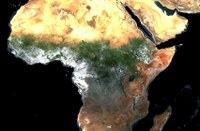 Recent trends suggest that this is possible, observed Romain Murenzi, the executive director of TWAS, at a roundtable discussion that took place at the annual meeting of the Board of Governors of the African Development Bank Group in Lisbon, Portugal.
Recent trends suggest that this is possible, observed Romain Murenzi, the executive director of TWAS, at a roundtable discussion that took place at the annual meeting of the Board of Governors of the African Development Bank Group in Lisbon, Portugal.
"The news out of Africa," Murenzi noted, "is brighter than it has been in a long time."
Between 2000 and 2010, for example, six of the world’s ten fastest-growing economies were in sub-Saharan Africa. These countries are: Angola (11.1% growth in GDP in 2010), Nigeria (8.9%), Ethiopia (8.4%), Chad (7.9%), Mozambique (7.9%), and Rwanda (7.6%).
Democracy is also on the march. A growing number of African countries currently enjoy some degree of democracy, including Mauritius, Cape Verdi, Botswana, Rwanda, Namibia, Benin, Guyana, Lesotho, Ghana and Mali.
And foreign direct investment (FDI) in Africa has increased by more than 80% during the past decade. In 2008, Africa received USD200 billion in FDI, although that figure has taken a sharp dip downward in the face of the global economic downturn.
Yet when it comes to science, technology and particularly innovation (STI), Murenzi lamented that the prospects dim considerably. Africa, which is home to 15% of the world's population, has less than 3% of all researchers. African scientists on average publish less than 2% of the articles in peer-reviewed international journals, and African technologists file less than one-tenth of 1% of the applications received by the US Patent Office.
Africa does indeed appear to be on a path to becoming an innovation hub of growth, noted Murenzi. The continent is endowed with ample natural resources, many of which have yet to be tapped; its youthful population gives it a demographic advantage over the ageing populations of many developed countries; it is currently attracting rising levels of foreign investment; and it is increasingly pursuing effective policies for poverty alleviation and economic growth that are paying significant dividends in improving the well-being of growing segments of its population.
However, as Murenzi cautioned, for economic growth to become deeply rooted and self-sustaining, Africa and its development partners will need to adopt a long-term investment strategy for STI. He added that in the coming decades such efforts will be crucial to building an enduring foundation for scientific excellence, which at the end of the day is the true source of innovation.
Other participants at the round table discussion included Mohamed H.A. Hassan, former executive director of TWAS; Boukary Savadoga, manager of the division of education at the African Development Bank; and Paul Ginies, director general of the World Bank's International Institute for Water and Environmental Engineering (2iE) Project for Burkina Faso.
Find the full TWAS Newsletter article below.

